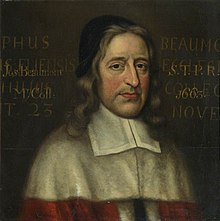Joseph Beaumont
together In 1644 he was one of the royalist fellows ejected from Cambridge, and he retired to Hadleigh, where he sat down to write his epic poem of Psyche.
Early in 1661 he went down to Ely to reside, at the bishop's request, but Mistress Beaumont caught the fen fever, and died on 31 May 1662.
In 1674 he was appointed Regius Professor of Divinity, and delivered a course of lectures on Romans and Colossians, which he forbade his executors to publish.
The allegorical poem represents the soul led by divine grace and her guardian angel through the various temptations and assaults of life into her eternal felicity; it is written in a six-line heroic stanza, and contains, in its abridged form, 30,000 lines.
In 1702 Charles Beaumont, the only surviving son, brought out a new edition, entirely revised, and enlarged by the addition of four fresh cantos.
Beaumont prefixed a copy of Latin verses to the Muse Juridicae of William Hawkins in 1634, and published in 1665, at Cambridge, Some Observations upon the Apologie of Dr. Henry More.
